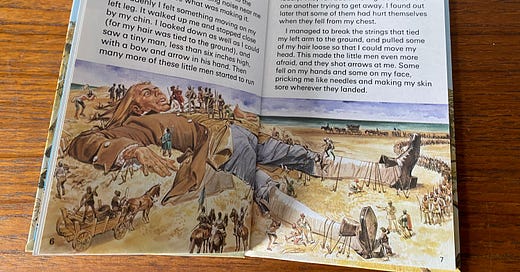Espresso-shot posts about writing, reading or the book industry. Readers are welcome to suggest topics.
Did you grow up with the pocket-sized Ladybird Children’s Classics? We had stacks of them — they were affordable because the format cost almost nothing to make. A few even survived four kids + the kids’ kids + the dog who liked to chew the stiff-card covers. The ones I remember best are the abridged, illustrated versions of famous literary works.
This week I was having a conversation about the loss of illustrations that readers experience on the way from picture books to middle-grade. Having encouraged their visual literacy as young children, we snatch it away. (And then wonder why they’re agog about graphic novels . . . for an educated lot, we are blundering idiots sometimes.)
There’s much to say about that but for now I only want to observe that despite having always been a wordy person, it is illustrations that make me feel the most nostalgic about childhood reading. Illustrations are instantly transporting to those long-ago days, and those long-ago feelings.
When two things happened to me this week that I’ll call The Standard Indignities of Being a Writer, an illustration from a Ladybird Classic unearthed itself from my childhood memory. I vividly remembered the way it had made me feel as a child, and in turn that provided me with the analogy I needed to fend off the present indignities.
Here it is: Gulliver tied down by the Lilliputians in Gulliver’s Travels by Jonathan Swift.
When I was little I had strong feelings about this image. It horrified me, the thought of being pinned down by hundreds of aggressive little people who saw me as their enemy. I felt the humiliation of being tied to the ground, the shock of finding that even my hair was pinned, and the tiny arrows described in the text, “pricking me like needles and making my skin sore wherever they landed”.
There was also part of me that didn’t believe this could happen to Gulliver. Why won’t you just get up, Gulliver? I used to think. Stop pretending that the Lilliputians can hurt you.
It was like the game my brother and I would play with my dad on weekends — when his briefcase stayed in the hall and he wore casual clothes and let us climb on him. Dad would pretend we were strong enough to pin him down and we relished the feeling of that power. Somewhere deeper I understood that it was only a game — the game of believing for a moment that I, or indeed anyone, could fell my big strong dad.
The Standard Indignities of Being a Writer are hundreds of Lilliputian arrows, and sure enough they sting. The two things that happened this week affected me differently. The first I was braced for: the Lilliputian was standing on my chest and I had enough movement to turn my head and let the arrow graze the side of my face. No harm done.
But the second arrow I didn’t see coming; I wasn’t ready. The sting of that was different. For twenty-four hours I wanted to set fire to everything I’ve done (yes, I’m hot-headed and reactive). But experience has taught me to sit with things, give the sting a little time to fade. I wanted to write about it quickly because I know how many of these tiny arrows I have taken and then forgotten about. Sometimes I worry that I have grown to be unsympathetic or careless about that time in your writing career when it seems all you get is arrows. That’s a really hard chapter.
When the arrows hit us, we inevitably go through this stage of wondering: why am I taking this? Why am I pinned down by the ankles, wrists and hair? Why can’t I just . . . get up?
We’re lying here on the ground pinned down because this is a game we’ve agreed to play. The humiliation of being tied up and letting people climb on us is one part of an epic story. We have to be big picture thinkers. If we keep a close eye, we’ll see the indignity coming and we’ll brace for it. The arrows don’t have the power; the sting is only temporary.
Take a breath and pluck out the arrow. It is only tiny, after all.
Did you miss the previous Minis? Here they are:
Minis #2: Writer’s Block in Disguise: And how to answer student questions when it's been a while since you were one
Minis #1: When What You Don’t Say Matters: One consideration when creating a character's voice






